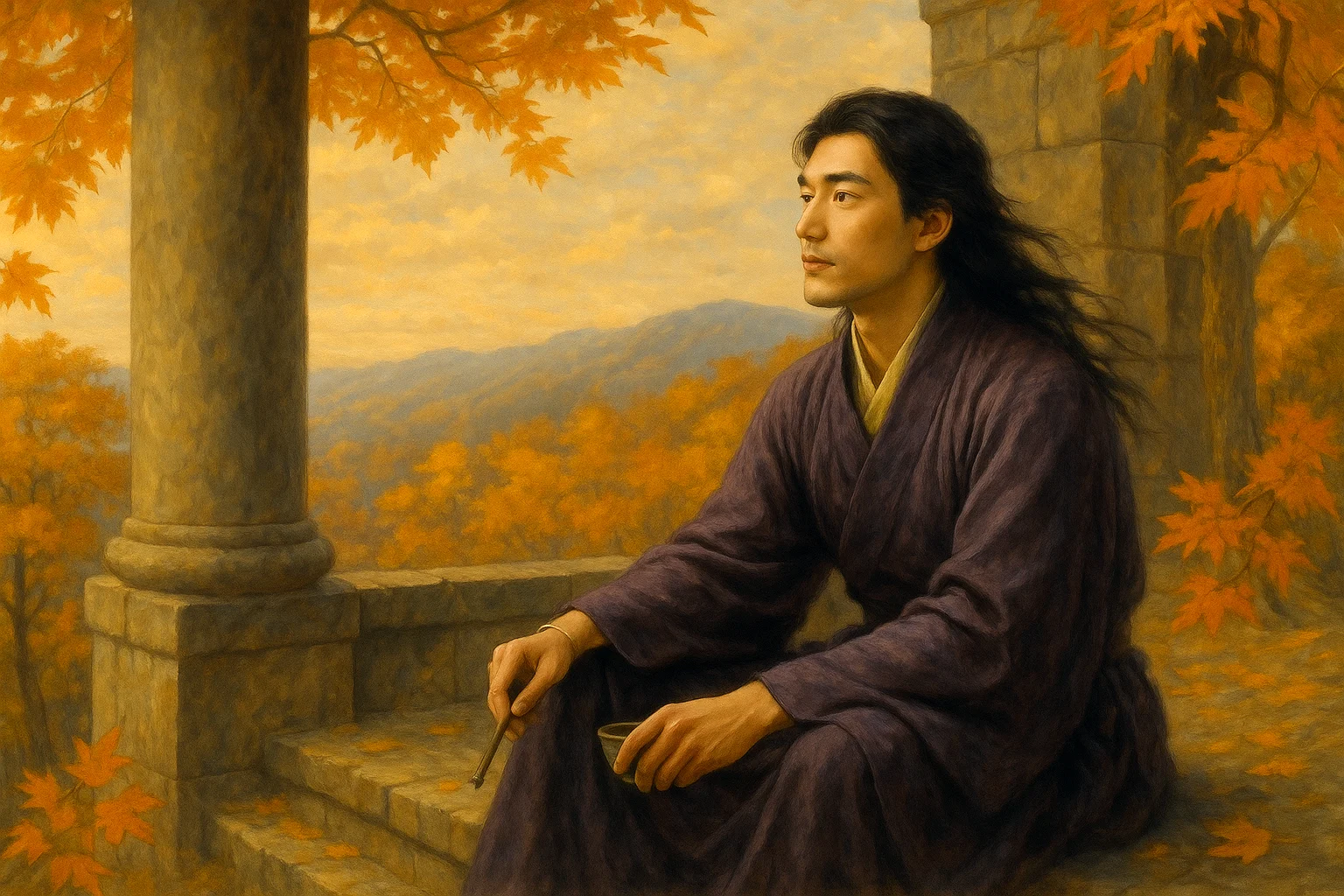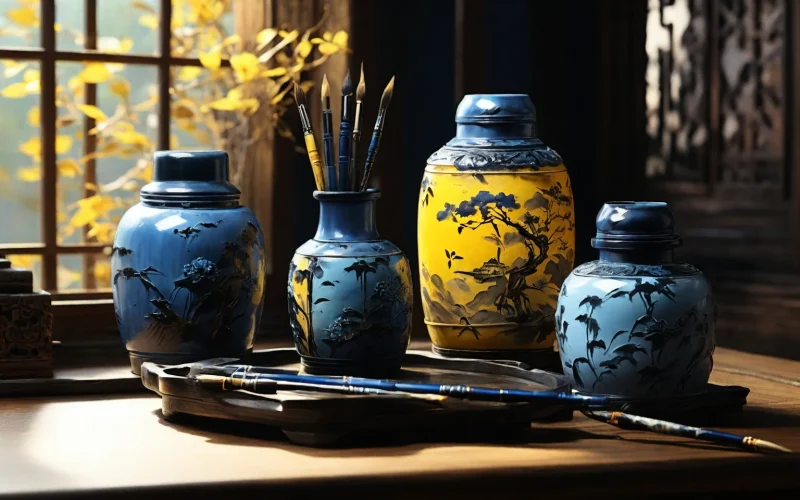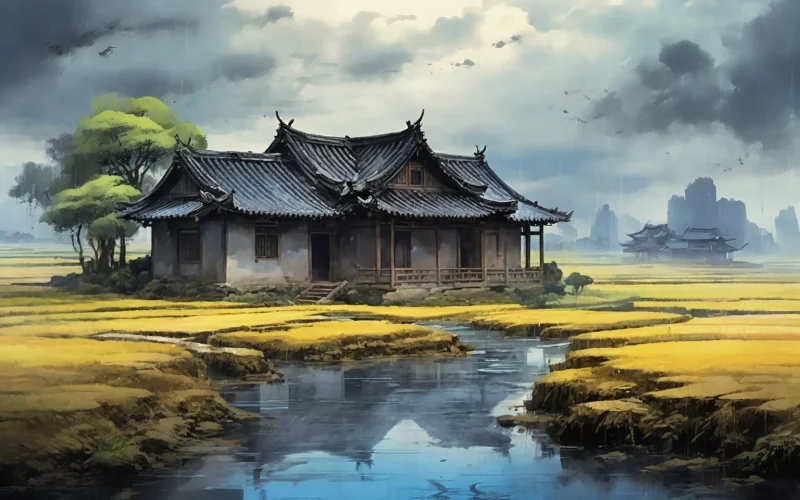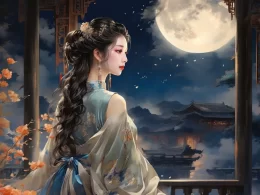Beneath the high moon, all is still—chickens, dogs.
The door closed, facing a cold pond’s chill.
Night bamboos shade the thatched abode,
An autumn courtyard, stone bench cold and lone.
Long years you dwell within the mountain’s breast,
Herbs you take, your life prolonged, blessed.
For one as idle and lost as me,
Meeting you only deepens melancholy.
Original Poem
「夜寻卢处士」
耿玮
月高鸡犬静,门掩向寒塘。
夜竹深茅宇,秋庭冷石床。
住山年已远,服药寿偏长。
虚弃如吾者,逢君益自伤。
Interpretation
This poem was composed by Geng Wei during a nocturnal visit to the hermit Lu, likely a sage he encountered in the mountains who embodied the ideals of reclusive living - cultivating virtue in nature's embrace, far from worldly strife. As one of the "Ten Literary Masters of the Dali Era," Geng Wei, despite his brilliance, found himself thwarted by an unpropitious era and a troubled official career, making him particularly drawn to the hermit's existence. Through depicting the nighttime mountain scenery and the recluse's persona, the poem articulates the poet's introspection, yearning, and quiet sorrow.
First Couplet: "月高鸡犬静,门掩向寒塘。"
Yuè gāo jī quǎn jìng, mén yǎn xiàng hán táng.
The moon hangs high, no sound of dog or fowl,
His gate shuts toward the pond's cold scowl.
The opening lines establish the serene stillness of the nocturnal visit. The bright moon mirrors the chill pond, while the silence of animals deepens the night's hush. This cold, tranquil scene sets the stage for showcasing Recluse Lu's transcendent life, simultaneously reflecting the poet's own solitude and melancholy.
Second Couplet: "夜竹深茅宇,秋庭冷石床。"
Yè zhú shēn máo yǔ, qiū tíng lěng shí chuáng.
Night bamboos veil his thatched abode,
Autumn chills the courtyard's stone repose.
Continuing to paint the hermit's dwelling, this couplet emphasizes simplicity, solitude, and quietude. "Night bamboos," "thatched hut," "autumn courtyard," and "stone bed" are all images of stillness and chill, illustrating not just the austerity of Lu's life but also his otherworldly detachment. These descriptions subtly foreshadow the poet's emotional undercurrents.
Third Couplet: "住山年已远,服药寿偏长。"
Zhù shān nián yǐ yuǎn, fú yào shòu piān cháng.
Years stretch long since he left the world,
Elixirs grant his life unfurled.
Shifting from scenery to subject, these lines portray Recluse Lu's meditative seclusion, blending the freedom of natural retreat with a sense of prolonged withdrawal. "Years stretch long" reveals his steadfast reclusion, while "elixirs grant" evokes the poet's admiration for this lifestyle. Here, Geng Wei both praises the hermit's way of nurturing life and reflects on his own urban toils and life's brevity.
Fourth Couplet: "虚弃如吾者,逢君益自伤。"
Xū qì rú wú zhě, féng jūn yì zì shāng.
A wastrel like myself, adrift,
Meets you and feels more keenlyrift.
The poet turns inward to articulate the emotional core. "Wastrel" is his self-assessment - one with aspirations but no means to fulfill them. "Feels more keenlyrift" expresses Geng Wei's acute regret upon witnessing the hermit's transcendent existence, contrasting sharply with his own worldly struggles and wasted years. This climactic revelation, where scene and sentiment merge, becomes the poem's most poignant moment.
Holistic Appreciation
This exquisitely crafted object poem uses the Xuanzhou brush as a profound metaphor, progressing from its material and form to its character and function, ultimately ascending to a declaration of scholarly integrity and ideals. Without directly mentioning human qualities, the poem consistently employs the brush as a vehicle for self-expression, seamlessly blending philosophy with emotion. The phrases "upholding rectitude" and "concealing no sharpness" encapsulate the poem's spiritual core, embodying the unyielding scholarly ethos that Geng Wei consistently championed. While ostensibly praising Xuanzhou's brush-making craftsmanship, this work is fundamentally a "self-portrait in verse"—composed against the politically complex backdrop of late High Tang, it expresses through brush imagery the poet's steadfast refusal to compromise his principles for power.
Artistic Merits
- Object as Allegory, Fusion of Form and Spirit: Through meticulous descriptions of the brush's physical attributes, the poem projects the poet's personal ideals, achieving perfect symbiosis between object and self.
- Progressive Structure, Logical Development: The four couplets systematically explore the brush's material, nature, utility, and symbolic value, creating a rigorous intellectual progression.
- Precise Diction, Rich Connotation: Employing economical yet exact imagery, the poem exemplifies the refined Dali poetic style with its restrained depth.
- Sublime in the Mundane: By investing an everyday writing implement with noble spiritual qualities, the work epitomizes the Tang tradition of "expressing ideals through objects."
Insights
The poem reveals that true value lies not in an object's form but in its symbolic function. An ordinary Xuanzhou brush gains profound significance through scholarly use and cultural association. Geng Wei transforms this humble tool into a mirror of Confucian virtues—integrity, transparency, diligence, and efficacy—demonstrating how extraordinary conviction can illuminate ordinary existence. For contemporary readers, this Tang masterpiece serves as a timeless reminder: maintaining authenticity while honoring one's talents allows anyone to shine through principled living.
About the poet

Geng Wei (耿湋, dates unknown), a Tang dynasty poet from Yongji, Shanxi, was among the "Ten Great Talents of the Dali Era." Renowned for his mastery of five-character regulated verse, his poetry is distinguished by its economical diction and tranquil imagery. While the prevailing style of Dali poetry tended toward austerity and desolation, Geng Wei developed a distinctive voice marked by understated naturalism.











